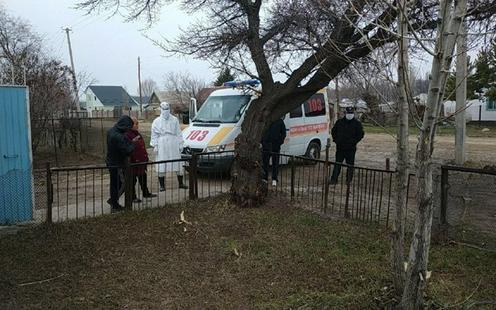ssyk-Kul village in the Tyup district of Kyrgyzstan’s Issyk-Kul region has been placed under quarantine after residents staged a protest against the work of the health authorities there, Kloop reports (in Russian).
On 31 March, an ambulance arrived in the village in order to conduct follow-up coronavirus tests on eight individuals who had recently returned from abroad and were supposed to be self-isolating. Earlier that day, the first two cases of the coronavirus in the Issyk-Kul region had been confirmed through follow-up tests on residents of other villages in the area whose initial tests upon returning from abroad had come back negative.
The residents of Issyk-Kul village, however, were reportedly angered by the decision to re-test their fellow villagers. Around 150 of them gathered at a checkpoint on the road into the settlement and refused to allow the police and ambulance team in. Issyl-Kul regional head Janybek Kojoyev told journalists that the residents had been misinformed and thought that infected individuals were being brought into the village.
Kojoyev explained that it was because of the demonstration (and not, as previously reported, simply because the individuals who were to be tested had broken their self-isolation) that the village was sealed off. “They (the demonstrators) came into contact with those who had returned from abroad, with the others who went to the demonstration. Such a large gathering of people, they should think of their own safety,” Kojoyev said.
This is the first mass action against anti-epidemic measures reported on by the Kyrgyz media. Previously only individual acts of revolt have been reported (such as the wife of a doctor serving with the state security service who tried to break through a checkpoint in Osh, following which her husband was fired), though hundreds have been arrested for violating curfew in Bishkek. Today, the government approved a bill setting out fines of between $250 and $3,700 for violating emergency and sanitary-epidemiological regulations, and even up to 5 years in jail for deliberate acts leading to mass infections.
Meanwhile, Kyrgyzstan has named epidemiologist Sabirjan Abdikarimov the country’s new health minister. Yesterday, health minister Kosmonbek Cholponbayev was fired after being heavily criticised (together with deputy PM for social affairs Altynay Omurbekova, who has also been replaced) by President Sooronbay Jeenbekov for insufficient work to stop the spread of the coronavirus. “In January, you said that our labs are ready,” Jeenbkov said to Cholponbayev, “But it turns out this was not the case. There was an insufficient stock of reagents for testing.”
As of 2 April, Kyrgyzstan has 116 confirmed cases of the COVID-19 coronavirus.










